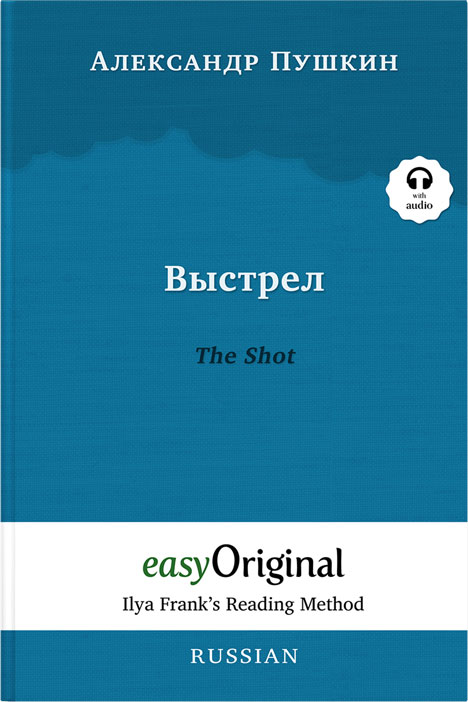Vystrel / The Shot
„The Shot“ (Выстрел) is a short story by Aleksandr Pushkin. It is the first story in Pushkin’s „The Tales of the Late Ivan Petrovich Belkin“, a cycle of five short stories.
The Shot details events at a military outpost in a Russian province, and then several years later, on a country estate. Pushkin discusses themes of honor, revenge and death, and places them within the broader context of Russian society. The Shot tells the story of a retired soldier named Silvio, who harbors a grudge for many years following an argument in which he was disrespected in front of his peers. Told from the perspective of an unnamed narrator, the story concludes with Silvio returning to seek his revenge against the man who wronged him, the Count.
Alexander Sergeyevich Pushkin was a Russian poet, playwright, and novelist of the Romantic era. He is considered by many to be the greatest Russian poet and the founder of modern Russian literature.
Unabridged original text. Bilingual book Russian-English.
Мы стоя́ли в месте́чке *** (we were stationed in the small town of ***; месте́чко — small town; ме́сто — place). Жизнь арме́йского офице́ра изве́стна (the life of an army officer is well-known). У́тром уче́нье, мане́ж (in the mornings, drill and riding school; уче́ние — training, learning; drill /mil./; мане́ж — riding arena; riding school); обе́д у полково́го команди́ра или в жидо́вском тракти́ре (dinner with the commander of the regiment or at the Jewish inn); ве́чером пунш и ка́рты (in the evenings, punch and cards). В *** не́ было ни одного́ откры́того до́ма (in *** there was not a single house open /to us/: “not one open house”), ни одно́й неве́сты (not one marriageable girl; неве́ста — bride); мы собира́лись друг у дру́га (we would meet in each other’s rooms: “we gathered at each other’s”; друг — friend; друг у дру́га — with each other), где, кро́ме свои́х мунди́ров, не вида́ли ничего́ (where there was nothing to be seen but our uniforms: “except our uniforms, we saw nothing”).
Мы стояли в местечке ***. Жизнь армейского офицера известна. Утром ученье, манеж; обед у полкового командира или в жидовском трактире; вечером пунш и карты. В *** не было ни одного открытого дома, ни одной невесты; мы собирались друг у друга, где, кроме своих мундиров, не видали ничего.


Bewertungen
Es gibt noch keine Bewertungen.